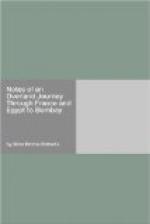The weather, during our short voyage, was remarkably favourable, although it got rather too warm, especially at night, for comfort. There are, however, great alleviations to heat in the Mediterranean steamers. The ladies can have a wind-sail in their cabin, which, together with the air from the stern windows, renders the temperature at all times very delightful. They enjoy another advantage in having a light burning all night, a comfort which cannot be too highly appreciated, since darkness on board ship increases every other annoyance.
We left Malta on the evening of the 25th, and arrived at Alexandria early in the morning of the 30th. Every eye was strained to catch the first view of the Egyptian coast, and especially of the Pharos, which in ancient time directed the mariners to its shores; but the great object of attraction at this period consisted of the united fleets, Turkish and Egyptian, which rode at anchor in the port. Our steamer threaded its way amid these fine-looking vessels, some of which we passed so closely, as to be able to look into the cabin-windows. To my unprofessional eye, these ships looked quite as efficient as any warlike armament of the same nature that I had yet seen. They all appeared to be well kept, and in good order, while the sailors were clean, neatly dressed, and actively engaged, some in boats, and others performing various duties. Though steamers are now very common sights, we in turn attracted attention, all eyes being directed to our deck.
Our Egyptian fellow-passenger was especially interested and agitated at his approach to his native shore, and the evidences which he saw before him of the power and political influence of the Pasha. From a gentleman who came on board, we learned that an apprehension had been entertained at Alexandria of the arrival of a hostile fleet from Europe, in which event a collision would in all probability have taken place. Mehemet Ali, it was said, was so foolishly elated by his successes, and by the attitude he had assumed, as to be perfectly




